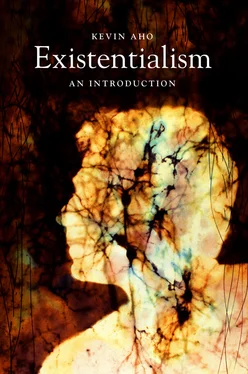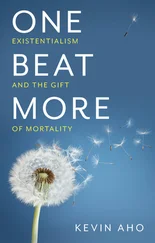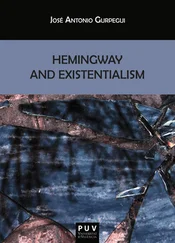Kevin Aho - Existentialism - An Introduction
Здесь есть возможность читать онлайн «Kevin Aho - Existentialism - An Introduction» весь текст электронной книги совершенно бесплатно (целиком полную версию без сокращений). В некоторых случаях можно слушать аудио, скачать через торрент в формате fb2 и присутствует краткое содержание. Год выпуска: 2013, ISBN: 2013, Издательство: Polity, Жанр: Философия, на английском языке. Описание произведения, (предисловие) а так же отзывы посетителей доступны на портале библиотеки ЛибКат.
- Название:Existentialism: An Introduction
- Автор:
- Издательство:Polity
- Жанр:
- Год:2013
- ISBN:978-0745651422
- Рейтинг книги:3 / 5. Голосов: 1
-
Избранное:Добавить в избранное
- Отзывы:
-
Ваша оценка:
- 60
- 1
- 2
- 3
- 4
- 5
Existentialism: An Introduction: краткое содержание, описание и аннотация
Предлагаем к чтению аннотацию, описание, краткое содержание или предисловие (зависит от того, что написал сам автор книги «Existentialism: An Introduction»). Если вы не нашли необходимую информацию о книге — напишите в комментариях, мы постараемся отыскать её.
Existentialism: An Introduction
Existentialism: An Introduction — читать онлайн бесплатно полную книгу (весь текст) целиком
Ниже представлен текст книги, разбитый по страницам. Система сохранения места последней прочитанной страницы, позволяет с удобством читать онлайн бесплатно книгу «Existentialism: An Introduction», без необходимости каждый раз заново искать на чём Вы остановились. Поставьте закладку, и сможете в любой момент перейти на страницу, на которой закончили чтение.
Интервал:
Закладка:
Oppression and recognition
One of the most important critiques of existentialism comes from the Marxist tradition, one suggesting that the existentialist's narrow focus on the individual and subjective freedom in the face of meaninglessness and death tends to overlook concrete forms of social and political oppression that invariably inhibit the possibility for authentic self-creation. On this view, existentialism represents the perspective of a small, privileged, and affluent class of people who are often writing behind the secure walls of the academy and whose living conditions are not already fraught with daily struggles for food, healthcare, and shelter. For the vast majority of people, then, the existentialist call to heroically confront the possibility of death is eclipsed by more basic material needs for physical survival in order to avoid actual death . Indeed, although the ideas may have informed the slogans of the student and labor revolts in France in May 1968 and the activist politics of the New Left in England and the United States, existentialism's emphasis on the solitary individual, the extensive criticisms of the bureaucratic state and mass society, and the rejection of the possibility of moral absolutes and the viability of normative ethics suggests a deep ambivalence toward politics. But this criticism only skims the service.
It is true that existentialists tend to neglect traditional political questions concerning human ‘rights,’ ‘justice,’ and ‘equality.’ These values are largely dismissed as ‘metaphysical comforts’ or manifestations of bourgeois conformism that get in the way of the individual's confrontation with freedom and death. But the careful reader understands that there is a deeper aim for the existentialists, one focused on a radical reconfiguration of the way we interpret ‘the human,’ one that challenges the modern liberal tradition and the view of the self as a rational, masterful, and atomistic subject. And this reconfiguration has opened up a more nuanced sensitivity to the particularities of human suffering and aspects of oppression and exploitation that have been largely covered over by the abstract universal values of liberal democracies. Thus, even though many held political positions that were at times questionable and in Heidegger's case despicable, their philosophies nonetheless laid the groundwork for new ways to theorize oppression by dismantling the assumptions of the modern self.
From a political perspective, to universalize ‘the human’ as a rational and sovereign subject is problematic, if not dangerous, precisely because it tends to exclude ‘ the Other ,’ those groups — women, colonized peoples, migrants, deviants, racial minorities, the mentally ill and disabled — who have historically existed outside of the dominant cultural discourse of reason and power. As Judith Butler notes regarding Islamic populations after 9/11: “[They] are considered less than human or ‘outside’ the cultural conditions for the emergence of the human … [and] they are regarded as not yet having arrived at the rational human. … It follows from such a viewpoint that the destruction of such populations … constitutes the destruction of what threatens the human, but not of the human itself” (2009, 125; cited in Kruks 2012, 27). One of the more significant contributions of existentialism, in this regard, is the recognition that reason is not a foundational or necessary given when it comes to conceptualizing ‘the human.’ It is, rather, a contingent historical construct that happens to take hold in the West with the dawn of Greek philosophy. Indeed, the existentialists show that reason plays only a small role in our everyday agency. As figures like Dostoevsky and Nietzsche made clear, our actions are all too often motivated by irrational drives, desires, and affects that we are never explicitly conscious of, and there is no political system that can fully contain them. It is a mistake, then, to regard the realm of politics as a neutral domain occupied by rational agents because unconscious drives and forces are already influencing our actions behind our backs. By challenging the notion of ‘the human’ in this way, existentialists have been able to create a discursive opening for those who exist on the margins, whose experiences fall outside the normative space of reason and who have, as a result, interpreted themselves as ‘invisible,’ ‘absent,’ or ‘unreal.’ Fanon offers an example as a colonized black man when he writes:
I was hated, despised, detested, not by the neighbor across the street or my cousin on my mother's side, but by an entire race. I was up against something unreasoned. … I would personally say that for a man whose only weapon is reason there is nothing more neurotic than contact with unreason. … When I was present, it [reason] was not; when it [reason] was there, I was no longer. (1967, 118–120)
Here, we see existentialism's critique of the rational subject and its recognition of the oppressive power of reason as a normative construct. But, more importantly, Fanon's words provide us with a positive acknowledgment of the concrete particularities lived out by individuals as situated, affective, and embodied ways of being and the forms of oppression unique to each situation. Of all of the major figures in existentialism, perhaps none engaged the theme of situated oppression more rigorously than Beauvoir.
In three important works, Beauvoir addresses different manifestations of oppression, exploring the situation of women in her masterwork The Second Sex (1949), indigenous and African Americans in America Day by Day (1954), and the elderly in The Coming of Age (1970) (see Kruks 2012). Following the existentialist credo, ‘existence precedes essence,’ Beauvoir recognizes there is no pre-given essence or nature — no disembodied reason or will — that makes us who we are. We are, rather, self-making beings that become who we are on the basis of the self-conscious choices and actions we make as our lives unfold. But, as we saw earlier, Beauvoir's project is unique in the way it articulates the extent to which these choices and possibilities are always constrained by the embodied situation we find ourselves in. The human is not a detached, free-floating consciousness surpassing the fleshly limits of age, sex, skin color, and ethnicity. Our freedom (i.e., transcendence) is always in a state of ambiguous tension or conflict with the ‘givenness’ (i.e., facticity) of our embodiment. Thus, against Sartre's early conception of ‘radical’ or ‘absolute’ freedom in Being and Nothingness , Beauvoir emphasizes that we can never fully rise above the material limitations of our bodies or the situated meanings and values of our culture. This is because it is only against a horizon of cultural meanings that we can understand ourselves, and it is this horizon that opens up possibilities for existing and interpreting ourselves in particular ways. This helps to explains why Beauvoir says that “the body is not a thing; it is a situation … subject to taboos [and] laws. … It is a reference to certain values from which [she] evaluates [herself]” (1952, 38, 40–41, my emphasis).
In The Second Sex , Beauvoir describes how the woman's situation is shaped by the structures of domination in Western patriarchy. Through socioeconomic and political power structures, the woman's capacity for transcendence is restricted in ways that the man's is not. She is, all too often, reduced to an object or thing, confined to the subjugated identities of a masculine world — as virgin, whore, mother, or housewife — and this closes her off from the possibility of creating her own life. She is, as Beauvoir writes, “shut up in a kitchen or boudoir, and astonishment is expressed that her horizon is limited. Her wings are clipped, and it is found deplorable that she cannot fly” (672). This helps us to understand what Beauvoir means when she says that the woman is not ‘ born’ subordinate by virtue of inferior anatomy and biology. Rather, she is ‘ made ’ subordinate by virtue of ‘being-in’ a masculine world. She is “shaped as in a mold by her situation. … Her convictions, her values, her wisdom, her morality, her tastes, her behavior — are to be explained by her situation” (664, 694). But the originality of Beauvoir's account is in how she articulates the ambiguity of oppression by showing how the woman is often complicit in her own objectification, willingly giving up her transcendence and embracing her identity as ‘ the Other .’ For Beauvoir, interpreting oneself as a passive, inferior, even childish thing has its advantages because it allows the woman to flee from her own freedom and from taking responsibility for her existence. In the famous introduction to The Second Sex , she writes:
Читать дальшеИнтервал:
Закладка:
Похожие книги на «Existentialism: An Introduction»
Представляем Вашему вниманию похожие книги на «Existentialism: An Introduction» списком для выбора. Мы отобрали схожую по названию и смыслу литературу в надежде предоставить читателям больше вариантов отыскать новые, интересные, ещё непрочитанные произведения.
Обсуждение, отзывы о книге «Existentialism: An Introduction» и просто собственные мнения читателей. Оставьте ваши комментарии, напишите, что Вы думаете о произведении, его смысле или главных героях. Укажите что конкретно понравилось, а что нет, и почему Вы так считаете.












